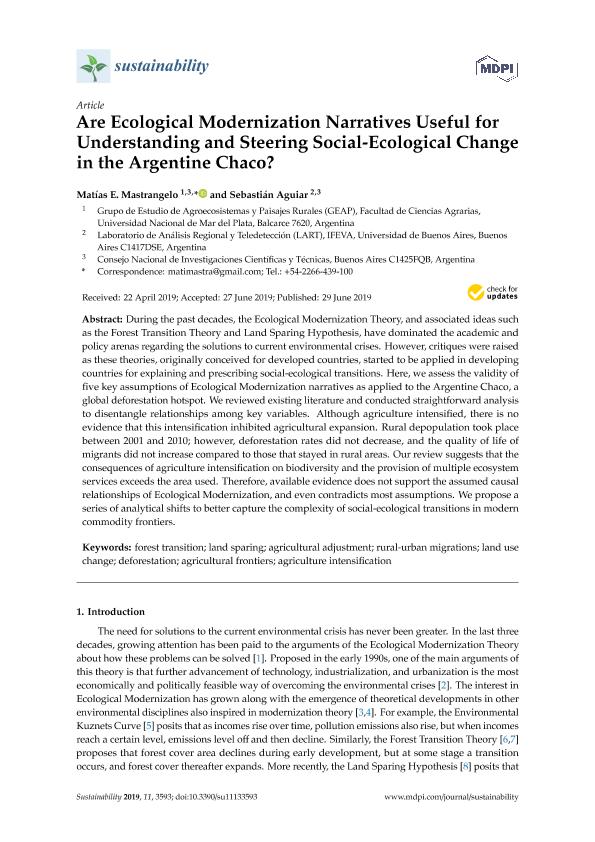Mostrar el registro sencillo del ítem
dc.contributor.author
Mastrangelo, Matias Enrique

dc.contributor.author
Aguiar, Sebastián

dc.date.available
2022-11-17T11:35:35Z
dc.date.issued
2019-06
dc.identifier.citation
Mastrangelo, Matias Enrique; Aguiar, Sebastián; Are Ecological Modernization Narratives Useful for Understanding and Steering Social-Ecological Change in the Argentine Chaco?; MDPI; Sustainability; 11; 13; 6-2019; 1-20
dc.identifier.issn
2071-1050
dc.identifier.uri
http://hdl.handle.net/11336/178127
dc.description.abstract
During the past decades, the Ecological Modernization Theory, and associated ideas such as the Forest Transition Theory and Land Sparing Hypothesis, have dominated the academic and policy arenas regarding the solutions to current environmental crises. However, critiques were raised as these theories, originally conceived for developed countries, started to be applied in developing countries for explaining and prescribing social-ecological transitions. Here, we assess the validity of five key assumptions of Ecological Modernization narratives as applied to the Argentine Chaco, a global deforestation hotspot. We reviewed existing literature and conducted straightforward analysis to disentangle relationships among key variables. Although agriculture intensified, there is no evidence that this intensification inhibited agricultural expansion. Rural depopulation took place between 2001 and 2010; however, deforestation rates did not decrease, and the quality of life of migrants did not increase compared to those that stayed in rural areas. Our review suggests that the consequences of agriculture intensification on biodiversity and the provision of multiple ecosystem services exceeds the area used. Therefore, available evidence does not support the assumed causal relationships of Ecological Modernization, and even contradicts most assumptions. We propose a series of analytical shifts to better capture the complexity of social-ecological transitions in modern commodity frontiers.
dc.format
application/pdf
dc.language.iso
eng
dc.publisher
MDPI
dc.rights
info:eu-repo/semantics/openAccess
dc.rights.uri
https://creativecommons.org/licenses/by/2.5/ar/
dc.subject
AGRICULTURAL ADJUSTMENT
dc.subject
AGRICULTURAL FRONTIERS
dc.subject
AGRICULTURE INTENSIFICATION
dc.subject
DEFORESTATION
dc.subject
FOREST TRANSITION
dc.subject
LAND SPARING
dc.subject
LAND USE CHANGE
dc.subject
RURAL-URBAN MIGRATIONS
dc.subject.classification
Ciencias Medioambientales

dc.subject.classification
Geografía Económica y Social

dc.subject.classification
CIENCIAS SOCIALES

dc.title
Are Ecological Modernization Narratives Useful for Understanding and Steering Social-Ecological Change in the Argentine Chaco?
dc.type
info:eu-repo/semantics/article
dc.type
info:ar-repo/semantics/artículo
dc.type
info:eu-repo/semantics/publishedVersion
dc.date.updated
2022-11-15T14:21:17Z
dc.journal.volume
11
dc.journal.number
13
dc.journal.pagination
1-20
dc.journal.pais
Suiza

dc.description.fil
Fil: Mastrangelo, Matias Enrique. Universidad Nacional de Mar del Plata. Facultad de Ciencias Agrarias. Laboratorio de Agroecología; Argentina. Consejo Nacional de Investigaciones Científicas y Técnicas. Centro Científico Tecnológico Conicet - Mar del Plata; Argentina
dc.description.fil
Fil: Aguiar, Sebastián. Consejo Nacional de Investigaciones Científicas y Técnicas. Oficina de Coordinación Administrativa Parque Centenario. Instituto de Investigaciones Fisiológicas y Ecológicas Vinculadas a la Agricultura. Universidad de Buenos Aires. Facultad de Agronomía. Instituto de Investigaciones Fisiológicas y Ecológicas Vinculadas a la Agricultura; Argentina
dc.journal.title
Sustainability
dc.relation.alternativeid
info:eu-repo/semantics/altIdentifier/url/https://www.mdpi.com/2071-1050/11/13/3593
dc.relation.alternativeid
info:eu-repo/semantics/altIdentifier/doi/http://dx.doi.org/10.3390/su11133593
Archivos asociados
